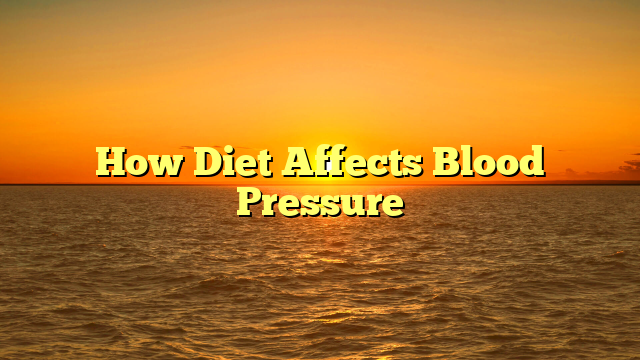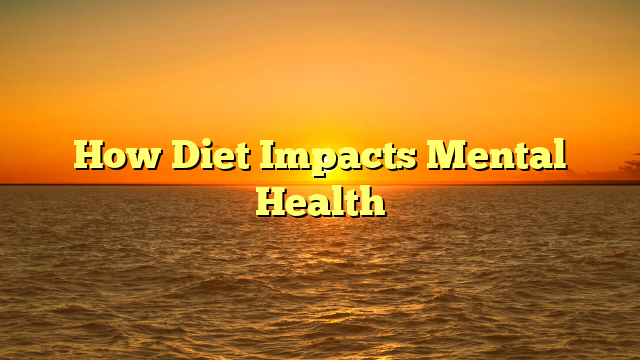How Diet Affects Blood Pressure
In “How Diet Affects Blood Pressure,” we explore the important correlation between our food choices and blood pressure levels. With a focus on providing news and information to help you live a healthy life, this article sheds light on the impact of diet on the often overlooked but crucial aspect of cardiovascular health. By understanding how the foods we consume directly influence blood pressure, we can make informed decisions that contribute to overall well-being.

The Basics of Blood Pressure
Definition of blood pressure
Blood pressure refers to the force of blood against the walls of your arteries as your heart pumps it throughout your body. It is measured in millimeters of mercury (mmHg) and consists of two numbers: systolic pressure over diastolic pressure. Systolic pressure represents the force when the heart contracts and pumps blood, while diastolic pressure represents the force when the heart is at rest between beats.
Normal range of blood pressure
A normal blood pressure reading is typically around 120/80 mmHg. The systolic pressure should ideally be below 120 mmHg, and the diastolic pressure should be below 80 mmHg. However, optimal blood pressure can vary slightly depending on factors such as age and overall health.
High blood pressure
High blood pressure, or hypertension, occurs when the force of blood against the artery walls is consistently too high. This condition can strain the heart and blood vessels, increasing the risk of serious health problems like heart disease, stroke, and kidney disease. A blood pressure reading of 130/80 mmHg or higher on multiple occasions is generally considered high.
Low blood pressure
Low blood pressure, also known as hypotension, refers to blood pressure that is consistently too low. It can cause symptoms such as dizziness, fainting, and fatigue. While low blood pressure is often not a cause for concern, extremely low levels can indicate an underlying health issue and should be evaluated by a healthcare professional.
The Role of Diet in Blood Pressure Control
The impact of sodium intake
Consuming too much sodium can lead to an increase in blood pressure. Sodium is commonly found in processed and packaged foods, as well as in added salt during cooking or at the table. Reducing sodium intake by choosing lower-sodium alternatives and cooking more meals at home can help maintain healthy blood pressure levels.
The effect of potassium-rich foods
Potassium is an essential mineral that can help lower blood pressure. Including foods such as bananas, oranges, spinach, and sweet potatoes, which are high in potassium, in your diet can help offset the negative effects of sodium and promote healthy blood pressure.
The role of calcium and magnesium
Calcium and magnesium play a crucial role in maintaining healthy blood pressure levels. Calcium helps regulate muscle contractions, including those of the heart, while magnesium helps relax blood vessels. Including dairy products, dark leafy greens, nuts, and seeds in your diet can ensure an adequate intake of these minerals.
The influence of alcohol consumption
Excessive alcohol consumption can raise blood pressure levels. Limiting alcohol intake to moderate levels, which is defined as up to one drink per day for women and up to two drinks per day for men, can help maintain healthy blood pressure.
The importance of fiber
Including fiber-rich foods in your diet, such as fruits, vegetables, whole grains, legumes, and nuts, can help lower blood pressure levels. Dietary fiber has been shown to have various cardiovascular benefits, including the reduction of blood pressure.
The benefits of a balanced diet
A balanced diet, consisting of a variety of nutrient-rich foods, is essential for blood pressure control. It should include fruits, vegetables, whole grains, lean proteins, low-fat dairy products, and healthy fats. Avoiding excessive intake of processed foods, added sugars, and saturated and trans fats is also crucial for maintaining healthy blood pressure levels.
Specific Diets for Blood Pressure Management
The DASH diet
The DASH (Dietary Approaches to Stop Hypertension) diet is a well-known eating plan that has been shown to effectively lower blood pressure. It emphasizes fruits, vegetables, whole grains, lean proteins, and low-fat dairy products while limiting sodium, saturated fats, and added sugars. Following the DASH diet can help individuals with high blood pressure achieve a healthier lifestyle.
The Mediterranean diet
The Mediterranean diet, inspired by the traditional eating habits of countries bordering the Mediterranean Sea, is another diet associated with positive impacts on blood pressure. It focuses on consuming fruits, vegetables, whole grains, legumes, lean proteins (such as fish and poultry), healthy fats (such as olive oil), and moderate amounts of red wine. This eating plan is not only beneficial for blood pressure management but also for overall cardiovascular health.
The vegetarian/vegan diet
Vegetarian and vegan diets, which eliminate or greatly reduce the consumption of animal products, can also contribute to lowering blood pressure. These diets typically emphasize plant-based foods, such as fruits, vegetables, whole grains, legumes, and plant-based proteins. However, it is important to ensure a balanced intake of essential nutrients, particularly vitamin B12, iron, and omega-3 fatty acids, when following a vegetarian or vegan diet.
The low-sodium diet
For individuals with high blood pressure or a predisposition to developing it, a low-sodium diet may be recommended. This involves limiting sodium intake to less than 1,500 milligrams per day. Avoiding processed foods, reading food labels for sodium content, and choosing fresh ingredients can help achieve the goal of reducing sodium intake.
The low-fiber diet
While fiber is generally beneficial for blood pressure control, there may be certain medical conditions or circumstances where a low-fiber diet is necessary. This diet restricts the intake of foods high in fiber, such as whole grains, fruits, vegetables, and legumes. It is typically only recommended for specific medical conditions and should be followed under the guidance of a healthcare professional.
Foods That Increase Blood Pressure
Processed and packaged foods
Processed and packaged foods often contain high levels of sodium, added sugars, unhealthy fats, and other additives that can increase blood pressure. These include items like canned soups, fast food, chips, and processed meats. Limiting the consumption of these foods is important for blood pressure control.
Highly salted foods
Foods that are heavily salted, such as salty snacks, pickles, and cured meats, can significantly contribute to increased blood pressure. Be mindful of your salt intake and opt for low-sodium alternatives whenever possible.
Caffeine and energy drinks
While moderate amounts of caffeine are generally safe for most individuals, excessive intake of caffeine, particularly from energy drinks, can cause a temporary increase in blood pressure. It is recommended to consume caffeine in moderation and consider alternative beverages, such as herbal tea or water.
Foods high in saturated and trans fats
Saturated and trans fats, commonly found in fried and processed foods, can raise blood cholesterol levels and contribute to hypertension. It is crucial to limit the consumption of foods high in these unhealthy fats, such as fatty cuts of meat, full-fat dairy products, and baked goods made with hydrogenated oils.
Alcohol
Alcohol consumption, particularly in excessive amounts, can elevate blood pressure levels. If you choose to drink alcohol, it is important to do so in moderation and within the recommended limits mentioned earlier.

Foods That Help Lower Blood Pressure
Fruits and vegetables
Eating a variety of fruits and vegetables, whether fresh, frozen, or canned (without added sugars or salt), can have a positive impact on blood pressure. These foods are rich in vitamins, minerals, and antioxidants that support overall heart health.
Whole grains
Choosing whole grains over refined grains can be beneficial for blood pressure control. Whole grains, such as brown rice, quinoa, whole wheat bread, and oatmeal, are packed with fiber and other nutrients that contribute to healthy blood pressure levels.
Low-fat dairy products
Including low-fat dairy products, such as skim milk, low-fat yogurt, and reduced-fat cheese, in your diet can provide important nutrients like calcium and potassium, which are associated with blood pressure regulation. However, if you have lactose intolerance or avoid dairy for personal reasons, there are non-dairy alternatives fortified with these nutrients available.
Lean proteins
Opting for lean proteins, such as skinless poultry, fish, legumes, and tofu, can be part of a blood pressure-friendly diet. These protein sources are lower in saturated fat compared to red meats and processed meats, which can contribute to high blood pressure.
Healthy fats and oils
Including sources of healthy fats in your diet is important for blood pressure control. Foods like avocados, nuts, seeds, and olive oil provide monounsaturated and polyunsaturated fats, which are heart-healthy and can help lower blood pressure.
Herbs and spices
Seasoning your dishes with herbs and spices instead of relying on salt can add flavor without increasing sodium intake. Herbs such as basil, thyme, oregano, and spices like cinnamon and turmeric offer not only taste but potential health benefits as well.
Key Nutrients and Their Impact on Blood Pressure
Sodium and its effects
While sodium is essential for our bodies, excessive intake can lead to increased blood pressure levels. It is important to moderate sodium consumption and avoid high-sodium foods to maintain healthy blood pressure.
Potassium and its effects
Potassium plays a significant role in balancing the negative effects of sodium on blood pressure. Adequate potassium intake helps relax blood vessels and lower blood pressure. Potassium-rich foods, including bananas, oranges, leafy greens, and potatoes, should be incorporated into a blood pressure-friendly diet.
Calcium and its effects
Calcium is involved in the contraction and relaxation of blood vessels, making it important for regulating blood pressure. Including calcium-rich foods like low-fat dairy products, fortified plant-based milk, and leafy greens can help maintain healthy blood pressure levels.
Magnesium and its effects
Magnesium is responsible for the relaxation of blood vessels, helping to lower blood pressure. Foods rich in magnesium, such as leafy green vegetables, nuts, seeds, and whole grains, should be included in a well-balanced diet for blood pressure management.
Fiber and its effects
Dietary fiber has been linked to a decreased risk of high blood pressure. It helps regulate blood glucose levels, provides a feeling of fullness, and supports heart health. Consuming a variety of fiber-rich foods benefits not only blood pressure but overall health as well.
Vitamins and minerals
Various vitamins and minerals, including vitamins C and D, as well as minerals like iron and zinc, contribute to overall health and can indirectly impact blood pressure control. Ensuring a well-rounded diet with a wide range of fruits, vegetables, whole grains, and lean proteins can help maintain optimal levels of these essential nutrients.

The Relationship Between Diet and Weight
Obesity and high blood pressure
Obesity is a known risk factor for high blood pressure. Excess body fat can increase resistance to insulin, cause hormonal imbalances, and lead to inflammation and oxidative stress, resulting in elevated blood pressure levels. Maintaining a healthy weight through a balanced diet can help prevent or manage high blood pressure.
The role of diet in weight management
Diet plays a crucial role in weight management. Choosing nutrient-dense foods, practicing portion control, and balancing caloric intake with physical activity are all important when it comes to achieving and maintaining a healthy weight. A well-designed eating plan can support weight loss efforts and subsequently contribute to improved blood pressure control.
Caloric intake and blood pressure
Maintaining a healthy caloric intake is essential for maintaining healthy weight and blood pressure. Consuming excessive calories can contribute to weight gain and subsequent increases in blood pressure. It is important to consume an appropriate number of calories based on individual needs and energy expenditure.
The impact of diet on body composition
Diet not only affects weight but also body composition. A diet that includes a balance of macronutrients (carbohydrates, protein, and fat) and meets individual nutritional needs supports a healthy body composition. Eating patterns that promote lean muscle mass and reduced body fat contribute to better blood pressure management.
Lifestyle Changes for Maintaining Healthy Blood Pressure
Regular physical activity
Engaging in regular physical activity, such as walking, cycling, swimming, or strength training, is essential for maintaining healthy blood pressure. Exercise helps improve cardiovascular health, promote weight loss, and reduce stress, all of which positively impact blood pressure levels.
Stress management
Stress can raise blood pressure temporarily, and chronic stress can contribute to long-term blood pressure issues. Finding effective stress management techniques, such as meditation, deep breathing exercises, yoga, or engaging in hobbies, can help lower stress levels and promote better blood pressure control.
Quitting smoking
Smoking and exposure to secondhand smoke can raise blood pressure and damage blood vessels, leading to an increased risk of heart disease and other health issues. Quitting smoking is crucial for overall health and blood pressure control.
Limiting alcohol intake
Excessive alcohol consumption can contribute to high blood pressure. Limiting alcohol intake to moderate levels, as previously mentioned, is important for maintaining healthy blood pressure. Furthermore, avoiding alcohol altogether may be recommended for individuals with certain health conditions or those taking specific medications.
Meal Planning Strategies for Blood Pressure Control
Importance of portion control
Monitoring portion sizes is important for maintaining overall caloric balance and blood pressure control. Using measuring cups, food scales, or portion control tools can help ensure appropriate serving sizes and prevent overeating.
Recommended servings from different food groups
Following dietary guidelines that emphasize a balanced intake from different food groups is beneficial for blood pressure control. For example, the USDA’s MyPlate recommends filling half your plate with fruits and vegetables, a quarter with lean proteins, and a quarter with whole grains.
Meal timing and frequency
Maintaining a consistent meal timing schedule can help regulate blood pressure. Eating smaller, more frequent meals throughout the day can also contribute to better blood pressure control. It is important to listen to your body’s hunger and fullness cues while adhering to an appropriate meal timing pattern.
Reading food labels
Reading food labels can help identify high-sodium and high-sugar products, which can negatively impact blood pressure. Paying attention to the sodium content per serving, as well as added sugars, can help make informed choices and select healthier options.
Meal prepping for success
Meal prepping involves planning and preparing meals in advance, typically for several days or the entire week. This strategy can help you make healthier choices, control portion sizes, and save time during busy weekdays. By having pre-portioned meals and snacks readily available, you can avoid hasty, unhealthy food choices and stay on track with your blood pressure management goals.
Conclusion
Maintaining healthy blood pressure is essential for overall well-being and minimizing the risk of cardiovascular diseases. While medication and medical interventions play a significant role in blood pressure control, lifestyle factors, particularly diet, also have a major impact. By understanding the basics of blood pressure, the role of diet, and the importance of specific nutrients, individuals can make informed choices to manage their blood pressure effectively. Adopting a balanced eating plan, such as the DASH or Mediterranean diets, and incorporating foods that lower blood pressure while avoiding those that increase it can contribute to better cardiovascular health. Additionally, other lifestyle changes like regular physical activity, stress management, quitting smoking, and limiting alcohol intake can further support healthy blood pressure. With careful meal planning strategies and a commitment to making positive choices, individuals can take control of their blood pressure and live a healthier life.








